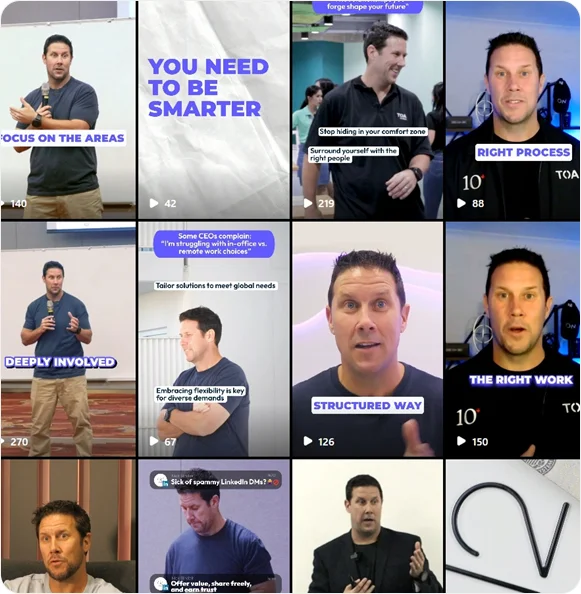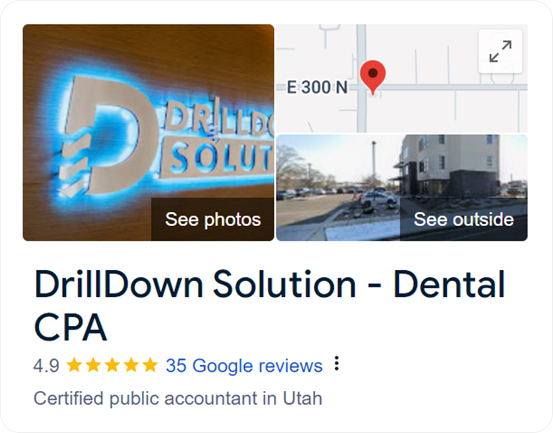7 Effective Digital Marketing Strategies Accounting Firms Can Implement Today

If you’re an accounting firm owner, you probably know by now that word-of-mouth isn’t enough to keep your pipeline full in the digital age. While referrals and local networking remain crucial, relying on them alone isn’t enough in today’s landscape. To stay competitive, you need to build a solid digital marketing strategy.
After working with over 1,100 accounting firms and building my own business from the ground up, I’ve seen firsthand how essential digital marketing is for a CPA firm’s success. I get it—marketing can feel overwhelming, especially when it’s not your expertise, and you constantly hear that digital marketing can be a money pit. That’s why I’ve put together the most effective, actionable strategies tailored specifically for accounting firms like yours so you can start seeing results immediately.
Here are some tried-and-true digital marketing tactics for accountants that will help you boost your visibility, attract more clients, and grow your business in the digital world.
1. Make It Easy for Clients to Find You Through the Magic of SEO
Search Engine Optimization (SEO) is where every accounting firm’s marketing strategy should begin. You want potential clients—small business owners, sole traders, or corporations—searching for accounting services to find you first. Think of your website as your firm’s digital storefront. If your site isn’t optimized for keywords your audience is typing into Google, you’re missing out on a massive pool of potential clients.
One quick tip is to start by focusing on local SEO. As an accounting firm, most of your clients will be in your city or region. Make sure your site has location-based keywords like “tax accountant in [city]” or “accounting for small business in [region]”. Incorporate these keywords into your service pages, blog posts, and meta descriptions. Also, don’t forget to claim and optimize your Google Business Profile. This will ensure your firm shows up in local searches and map results.
But SEO is not just about stuffing your website with keywords. Google rewards quality content, so regularly publishing blogs, guides, podcasts, etc., that answer the most asked questions can give you an edge. Imagine a business owner searching for “how to reduce tax liability,” and your firm’s blog post pops up at the top of the search results. That’s not just visibility—that might be the beginning of a client relationship.
2. Content Marketing: Building Trust Through Education
I’ve always been a big advocate for educating clients before they ever become clients. People want to work with experts, and content marketing lets you showcase your mastery before they ever reach out. You can showcase your expertise and build trust through blogs, whitepapers, guides, and videos.
Start by writing about topics that matter to your clients, such as:
- How to prepare for tax season
- Bookkeeping tips for small businesses
- Breaking down complicated financial legislation into simple terms
These are just some general examples, every niche/industry has unique questions and pain points, so make sure to personalize your topics and content for them.
When you provide content that solves their problems or eases their concerns, you become the go-to source for information, and in accounting, trust is everything. The more valuable content you offer, the more prospective clients will see you as the authority they need to solve their accounting problems.
Content can also serve as a way to nurture leads. For example, offering a downloadable financial planning guide or a tax prep checklist in exchange for an email address can help you build a robust email list. Once they’re on your list, you can keep them engaged with regular updates, news, and more helpful content.
3. Connect with Potential Clients and Peers Through Social Media
Social media marketing might not seem like a natural fit for accounting firm leaders, but it effectively connects you with potential clients and complementary business partners. LinkedIn should be your top priority, as it allows business owners and professionals to spend time learning and networking. Posting regularly on LinkedIn helps keep you in front of potential clients and positions you and your firm as thought leaders in accounting.
Spruce Up Your Profile
First, for your personal LinkedIn profile, ensure that your bio communicates who you are, your expertise, and your services. Think of it as your elevator pitch. Don’t just list “Owner at XYZ Accounting Firm”—go deeper! Talk about your specialization, experience, and the type of businesses that you’re helping. Your summary should be client-centric, focusing on how you solve their problems, not just your resume.

Your firm’s LinkedIn page, on the other hand, should mirror this same level of professionalism. Ensure your description clearly and compellingly outlines your firm’s values, services, and unique differentiators. Include key search terms that potential clients might use to find your services, helping improve visibility in LinkedIn’s search engine. Keep your banner image relevant and professional, showcasing your brand.
Share Valuable Social Media Content
Share insights, case studies, reports, or even quick tips that are helpful to your audience. You don’t need to sell your services in every post. Content that provides helpful advice or insights often generates the most engagement.
Pro Tip: Share snippets and highlights from your blogs and guides to repurpose existing content, then link back to the full resource. This way, you consistently provide value on social media while driving traffic to your site.
People Appreciate Authenticity
You might also consider expanding to platforms like Facebook and Instagram, where you can showcase the personal side of your firm. Client testimonials, team highlights, and behind-the-scenes content humanize your brand and build trust with potential clients. People want to work with firms they know and like, and social media is an excellent way to establish those connections.

Video Content
Finally, don’t forget about video content. With the rise of short-form videos, you can easily create and share clips answering common questions or explaining tax strategies. Video content is engaging and allows clients to get a feel for who you are and how you communicate—building a rapport before they even work with you.

4. Keep Your Existing and Potential Clients in the Loop with Email Marketing

While social media is great for outreach, email marketing remains one of the most cost-effective tools for nurturing relationships and maintaining communication with existing and potential clients. Regularly sending out newsletters filled with industry updates, tax law changes, and firm news will keep your audience engaged and remind them of your competence.
The key is personalization—segment your email list into different groups based on their needs. For example, business owners may be more interested in corporate tax planning strategies, while individual clients might appreciate personal finance tips. Tailoring your content to different audiences ensures higher engagement and ultimately, more leads.
One thing I’ve found particularly useful is sending reminders about key deadlines. It’s a simple gesture, and business owners appreciate that. It shows you’re on top of things. Additionally, when it comes time for prospects to choose a firm for their tax or accounting needs, they’re far more likely to pick the firm, helping them stay informed all along.
5. Accelerate Your Growth with Paid Advertising
If you’re looking for an expedited way to boost your firm’s visibility, paid advertising can be a game-changer. Google Ads allows you to target keywords potential clients are searching for. While SEO is essential for the long haul, paid ads can instantly place your firm at the top of search results. Start by targeting local keywords and focus your budget on high-intent searches like “accounting firms near me” or “small businesses accounting services.”
Social media platforms like LinkedIn and Facebook also offer powerful advertising tools that allow you to target your ads to specific industries, job titles, and even company sizes. Imagine your ad appearing directly to business owners seeking accounting services or financial guidance, that’s precision marketing at its best.
What’s more, retargeting ads can help bring potential clients back to your website if they don’t convert the first time. Perhaps someone visited your site but didn’t fill out a contact form; retargeting ads will keep your firm in front of them as they continue their online journey, increasing the likelihood they eventually reach out.
However, be mindful that paid advertising can quickly deplete your marketing budget. Before launching a campaign, create a clear plan to prevent overspending without seeing results.
6. Ask for Online Reviews and Build Your Reputation One Client at a Time
Reputation is everything for accounting firms, and online reviews are the new word-of-mouth. 49% of consumers would trust online reviews as much as personal recommendations from family and friends, so it’s important to gather positive client feedback actively. Encourage satisfied clients to leave reviews on Google, Yelp, or other relevant platforms. These reviews not only help improve your SEO rankings but also provide potential clients with social proof that your firm delivers.

(Example of a Great Google Business Profile: TOA Global Client, DrillDown Solution)
Don’t shy away from negative reviews either. Respond to them professionally and address their concerns. A well-handled response can actually improve your reputation by showing potential clients that you take feedback seriously and are committed to providing excellent service.
7. Analytics: Fine-Tune Your Strategy
If there’s one thing I’ve learned from running a nine-figure business, it’s that data never lies. Measuring the performance of your digital marketing efforts is crucial to understanding what’s working and what’s not. Use tools like Google Analytics and SEMrush to track your website traffic and identify which pages or blogs draw the most visitors. This information will help you refine your content strategy to focus on the topics that resonate most with your audience.
Similarly, social media platforms offer detailed analytics on engagement, reach, and conversions, allowing you to adjust your campaigns for maximum effectiveness. Regularly reviewing your performance metrics ensures you’re making informed decisions and continuously fine-tuning your marketing strategy for success.
Take Your Firm’s Growth to the Next Level with TopFirm’s CPA Coaching
Building a solid digital marketing strategy for your accounting firm isn’t something to be done overnight, but eventually, it is achievable with the right steps. Implement the strategies above today to stay competitive and position your firm for long-term success.
If you’re looking for more ways to boost your firm’s growth but don’t have the time to figure it out yourself, our coaching services are designed to give you the tools and guidance you need to succeed. Schedule a free growth session today to discover how we can help you build a strong online presence that drives sustained client acquisition and long-term growth.
About the Author:
Nick Sinclair
Founder – TopFirm
Nick Sinclair is a visionary leader in the accounting industry, dedicated to helping CPA firm owners unlock their true potential. With 20+ years of experience, Nick has built an impressive career as an entrepreneur, coach, and former owner of an accounting and financial planning firm. He has founded transformative companies like TOA Global, Ab² Institute of Accounting, and TopFirm, collectively empowering more than 1,100 firms worldwide.


